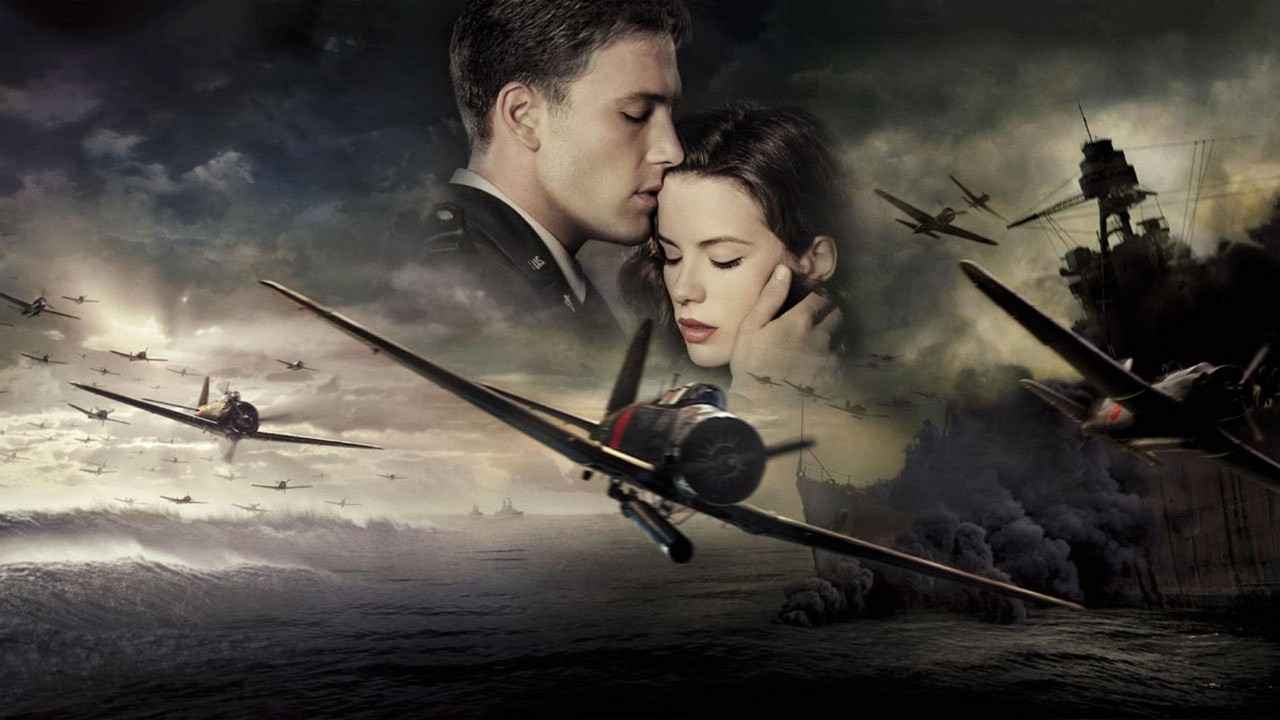The calendar has flipped past Memorial Day and we find ourselves in the midst of Hollywood’s annual blockbuster season, a stretch of summer during which the regular world gets blurred with a CGI world and huge special effects rule the box office. Michael Bay, of course, has carved a lucrative career from the charred remains of bridges. He strikes again this year with Transformers: Age of Extinction, the fourth installment in a series Mark Wahlberg recently referred to as “probably the most iconic franchise in movie history.”
From the shade of Marky Mark’s contextual umbrella, I feel compelled to share an awakening of my own regarding the Church of Bay. I was recently flipping through a pretty drab slate of cable entertainment when a listing caught my eye and sent the rest of my evening veering onto a course set for me by the brilliant savant, He, Michael Bay.
Pearl Harbor was just starting on Bravo.
I had never seen the film before, and my knowledge of it didn’t expand much further than its status as a longtime tetherball for comedians and satirists to smack around. But the opening sequence was sort of pretty, and the beer sitting in front of me, plus the five more in the fridge, were wryly daring, “you won’t.” I would. I did.
Before I knew it, The Michael had reeled me in for four hours of his nauseating best, an effort so fascinatingly awful that not even a combined 200 Maybelline and Neutrogena commercials could steer me away. What I witnessed I’m not comfortable calling the worst movie ever made, due to a certain degree of technical competence. I amazingly can’t even in good faith call it the worst Ben Affleck movie ever made. I will however climb onto any soapbox to scream that it is the worst blockbuster the world has ever seen.
You might think that a tale recounting the attack on Pearl Harbor, perhaps the keystone event of 20th century America, would have a strong inherent conflict, be it that one imperial power launched a devastating surprise attack on another. That was the way it happened in the real world. But in Michael Bay’s world, the story goes a little differently. Here the essential conflict is a hokey love triangle between Ben Affleck, Kate Beckinsale, and Josh Hartnett, which endures emotional tribulations due to that annoying war occurring around it. Here an elite squadron of men takes its orders from Alec Baldwin. And here people speak lines of dialogue that couldn’t have been more cliché-ridden had Nicholas Sparks scribed them while bathing in corn syrup.
The most egregious offense is the depiction of the attack on Pearl Harbor itself, a bombastic display of CGI firepower that spans two commercial breaks and follows the Michael Bay model of blowing up nameless characters with the same level of empathy as a child stepping on ants. While the scale is impressive, I couldn’t help but feel disturbed at how the film took such a significant moment in world history and reduced it to a series of BOOM BOOM KABLOOM shots that provided no glimpse into what the real stories were that day, other than showing that shit exploded. There is less of a buildup to the military battle than there is to the “You slept with my girl//I’m sorry man we thought you were dead” fistfight that occurs the night before between Affleck and Hartnett, best friends who then must set their differences aside and fight off the Japanese Air Force. Michael Bay actually managed to make a movie called Pearl Harbor wherein the attack on Pearl Harbor was reduced to an obligatory plot device.
Of course, filmmakers have the artistic license to focus on whatever they want to. But tackling a subject like Pearl Harbor, which resulted in over 2,000 lost American lives, should be done with some deftness of touch. There is an important distinction between creating action-fetish sequences that involve overgrown aliens and robots and ones that reflect actual events. I know that war movies depict all kinds of violent deaths with no pretext; it would be impossible to humanize every cinematic casualty. However, what makes this movie particularly terrible is the cavalier way with which it trivializes history in pursuit of grandiose visuals and sappy romantic bullshit. It’s like Michael Bay needed a story, any story, to accompany his expansive artillery of special effects and thought, “Oh, Pearl Harbor could be cool.”
Ultimately Michael Bay will keep making movies, and those movies will keep selling tickets, and that is fine. But never again should he be allowed to get his pyromaniac hands on real history. Because despite only being denied an impressive haul of Golden Raspberries by the juggernaut that is Freddy Got Fingered, Pearl Harbor grossed nearly $450 million worldwide. And we all know what Michael Bay’s first thought was when he saw those numbers.
“How can we make Pearl Harbor 2?”
